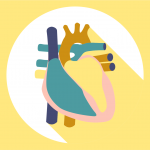Heart Failure Treatment Option
- Heart failure is a condition that causes the heart to not pump blood as well as it should. It does not mean that your heart has actually "failed" or stopped beating; it's just that it is having some issues pumping blood.
- Part of treating heart failure has to do with managing risk factors; There are several available medications and patients with more advanced disease may need surgery.
- One somewhat new FDA-approved drug is vericiguat (drug name Verquvo), which is for patients with heart failure who have a weakened heart muscle, says Dr. Aeshita Dwivedi, a non-invasive cardiologist at Lenox Hill Hospital in New York, NY.
Dr. Aeshita Dwivedi, a non-invasive cardiologist at Lenox Hill Hospital in New York, NY, explains to SurvivorNet that Verquvo is used for patients with heart failure who have a weakened heart muscle “and were recently admitted to the hospital with a heart failure exacerbation or need IV treatment with diuretics as an outpatient.”
Read More"A lot of the symptoms in heart failure are actually related to backing up of blood in your lungs, as well as your feet, because your heart becomes inefficient in pumping the blood forward. The mainstay of treating this backing up of blood is diuretics. Lasix (furosemide) is commonly used to get rid of the extra fluid in your body," says Dr. Dwivedi.
Verquvo – How It Works
The way Verquvo works is it “dilates the blood vessels in the lungs, as well as your body and decreases the workload on the heart and this is how it’s shown to help people with heart failure,” she continued.
The FDA approval was based on a Phase 3 VICTORIA trial, which compared Verquvo to a placebo in 5,050 adult patients with symptomatic chronic heart failure, according to Merck.
According to the Verquvo website, the main side effects are low blood pressure and low red blood cells (anemia). It also advises pregnant women not to take the medication as it may cause birth defects.
Side Effects From Other Heart Failure Medications
Some common medications for people with heart failure are angiotensin converting enzyme (ACE) inhibitors, which decrease pressure inside blood vessels; angiotensin receptor blockers, which reduce the workload of the heart; beta blockers, which reduce the heart’s tendency to beat faster and reduce workload; aldosterone blockers, which block the effects of the hormone aldosterone; and angiotensin receptor-neptrilysin inhibitors (ARNIs), which are a new class of drugs that reduce excess fluid in the body and relax blood vessels.
Each of these medications have possible side effects. The potential side effects are as follows:
ACE inhibitors
ACE inhibitors decrease the pressure inside the blood vessels and reduce the resistance against which the heart pumps. Side effects may include:
- Dizziness
- Low blood pressure
- Changes in kidney function
- Dry cough
- Increased potassium levels
- Swelling in the lips or throat
Angiotensin receptor blockers
Angiotensin receptor blockers (ARBs) are an alternative treatment for reducing the workload on the heart in cases where ACE inhibitors are not well-tolerated. These can also cause a number of similar side effects, including:
- Dizziness
- Low blood pressure
- Changes in kidney function
- Increased potassium levels
Beta blockers
Beta blockers reduce the heart’s tendency to beat faster and reduce its workload by blocking specific receptors on heart cells. These drugs may cause side effects, such as:
- Feeling tired
- Dizziness
- Weight gain
- Wheezing/shortness of breath
- Low blood pressure
- Slow heart rate
- Sexual side effects (erectile dysfunction in men and low libido in women)
“Some people may also experience fatigue with beta blockers, and especially in men, some patients might experience erectile dysfunction,” Dr. Dwivedi says. “Of course, at that point, it is important to have a conversation with your doctor about the side effects that you’re having and deciding the risks and the benefits of continuing the medication, and also ways to circumvent the side effects.”
Aldosterone blockers
These drugs block the effects of the hormone aldosterone, which causes sodium and water retention. They could also be called aldosterone antagonists, “water pills,” or diuretics. Possible side effects include:
- Changes in kidney function
- Increased potassium levels
- Swelling/tenderness of the breasts
- Decreased testosterone in men (which could lead to low libido)
- Irregular menstrual cycles in women
ARNIs
These are a relatively new class of medications that have been shown to yield really promising results in some patients. Common side effects include:
- Dizziness
- Low blood pressure
- Changes in kidney function
- Increased potassium levels
Because serious side effects are a possibility, it’s important to keep communication with your doctor open and report anything that feels out of the ordinary.
“A lot of the heart failure medications can raise your potassium levels or worsen the kidney function in some settings. So, it’s important to get your blood work done regularly and see your doctor regularly, if you are on these medications,” Dr. Dwivedi says. “[And] beta blockers, like Metoprolol or Carvedilol, lower your blood pressure and your heart rate. This in turn can make people dizzy or lightheaded. So, of course it’s important to talk to your doctor, if you’re facing any side effects.”
Questions to Ask Your Doctor
- What side effects should I be aware of before beginning medication?
- What are the risks vs. benefits of this medication?
- How can I contact you if I experience side effects?
- What are the options if the medication must be discontinued?
Contributor: Dr. Rodrigo Edelmuth and Laura Gesualdi
Learn more about SurvivorNet's rigorous medical review process.




